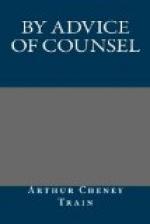Perhaps, after all, we have been a bit hard on Payson, Jr. He was fundamentally, as his father had perceived, good stuff, and wanted to do the right thing. But what is the right thing? Really it isn’t half as hard to be good as to know how.
As the orphaned Payson, ensconced in lonely state in one of the funeral hacks, was carried at a fast trot down Broadway towards the offices of Tutt & Tutt, he consoled himself for his loss with the reflection that this was, probably, the last time he would ever have to see any of his relatives. Never in his short life had he been face to face with such a gathering of unattractive human beings. He hadn’t imagined that such people existed. They oughtn’t to exist. The earth should be a lovely place, its real estate occupied only by cultured and lovely people. These aesthetic considerations reminded him with a shock that, just as he had been an utter stranger to them, so he had been a stranger to his father—his poor, old, widowed father. What did he really know about him?—not one thing! And he had never tried to find out anything about him,—about his friends, his thoughts, his manner of life,—content merely to cash his checks, under the unconscious assumption that the man who drew them ought to be equally content to be the father of such a youth as himself. But those rusty relatives! They must have been his father’s! Certainly his mother’s wouldn’t have been like that,—and he felt confident he took after his mother. Still, those relatives worried him! Up at Harvard he had stood rather grandly on his name—“Payson Clifford, Jr.,”—with no questions asked about the “Senior” or anybody else. He now perceived that he was to be thrown out into the world of fact where who and what his father had been might make a lot of difference. Rather anxiously he hoped the old gentleman would turn out to have been all right;—and would have left enough of an estate so that he could still go on cashing checks upon the first day of every month!
It was one of the unwritten laws of the office of Tutt & Tutt that Mr. Tutt was never to be bothered about the details of a probate matter, and it is more than doubtful whether, even if he had tried, he could have correctly made out the inventory of an estate for filing in the Surrogate’s Court. For be it known that, while the senior member of the firm was long on the philosophy of the law and the subtleties of “restraints on alienation,” “powers,” “perpetuities” and the mysteries of “the next eventual estate,” he was frankly short on the patience to add and subtract. So while Mr. Tutt drew their clients’ wills, it was Tutt who attempted to probate and execute them. Then, if by any chance, there was any trouble or some ungrateful relative thought he hadn’t got enough, it was Mr. Tutt who reluctantly tossed away his stogy, strolled over to court and defended the will which he had drawn,—usually with success.
So it was the lesser Tutt who wrung the hand of Payson Clifford and gave him the leathern armchair by the window.




